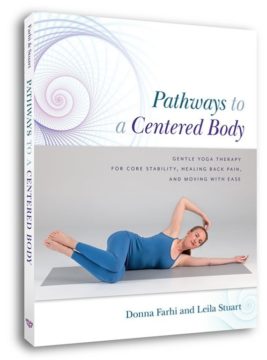
Pathways to a Centered Body: Gentle Yoga Therapy for Core Stability, Healing Back Pain, and Moving with Ease by by Donna Farhi and Leila Stuart
Reviewed by Rose Kress
Have you ever had the experience of trying to center yourself but your mind feels scattered, or you keep remembering things you need to do? Maybe you go to sit and you become so distracted that you end up doing something different. Or maybe “being centered” seems so far off, it’s not even worth trying for. Perhaps it is the body that feels disconnected and scattered. In Pathways to a Centered Body, Donna Farhi and Leila Stuart provide gentle opportunities for working with the body, specifically the psoas muscle, to help you feel more grounded, centered, and even secure.
“Core” fitness has become a buzzword that often alludes to flat and strong abdominal muscles. As the authors point out, the practices have “limited efficacy because they neglect to address the deeper foundation muscles that form the scaffolding for a truly centered pelvis and upright spine” (1). The authors are speaking about the iliopsoas muscle. Farhi and Stuart do an amazing job walking the lay person through the structure of these deep core muscles in Chapter Two. 33 pages of anatomy may seem daunting to some; however, the chapter is full of illustrations, stories, and practices. Each section in this chapter is followed by Key Concepts, a bullet-point summary.
The authors do a beautiful job of elevating the discussion of the iliopsoas complex to include its impact on the entire structure, including the emotions and the mind. The psoas muscles pass through openings in the breathing diaphragm and their attachments overlap. “A chronically tight psoas can inhibit the free movement of the diaphragm” (33). Why might the psoas by chronically tight? Because the psoas connected to the sympathetic nervous system (fight or flight and stress response) it is the major muscle affected by the stress response. This muscle can even hold the traumas a person has experienced. Understanding this relationship may help to explain why someone might struggle with the breath, why someone might feel unstable practicing hip openers, and why emotions come up in relation to the breath.
For reasons mentioned above, and more, the authors outline a slow and gentle process of working with the iliopsoas complex. This book outlines a Six-Step Protocol for working with the psoas: 1) Find It, 2) Soften and Hydrate It, 3) Release and Lengthen It, 4) Balance It, 5) Strengthen It, and 6) Move From It. Finding it is not just understanding the anatomy, but also starting with breathing exercises. Farhi and Stuart also do a wonderful job of providing myriad options for lying down and breathing. These opportunities address mobility issues and different injuries in the spine to make the practice accessible for as many people as possible. Moving through the book and the practices, the exercises and positions provided in each section are easy to understand and duplicate. If one seems confusing to the reader, there are often several other options that may make more sense.
Pathways to a Centered Body is the gentlest psoas work this reviewer has encountered. Going through the text and practicing the techniques brought a sense of ease and a feeling of success, “I can do all these practices!” In addition, as the psoas is softened, hydrated, released, balanced, and strengthened, feelings of empowerment, and emotional strength arise.
When you order this book, order a block, a strap, and a Muscle Release Ball because you will want to try all of the practices!
This book is a fantastic resource. The gentleness and slowness of the approach fits in beautifully with the LifeForce Yoga methodology.